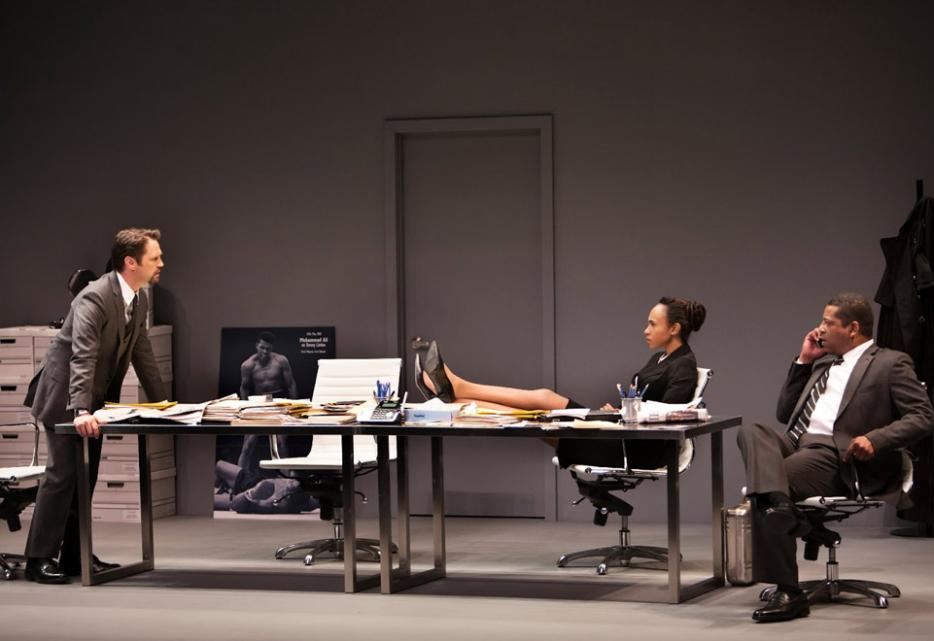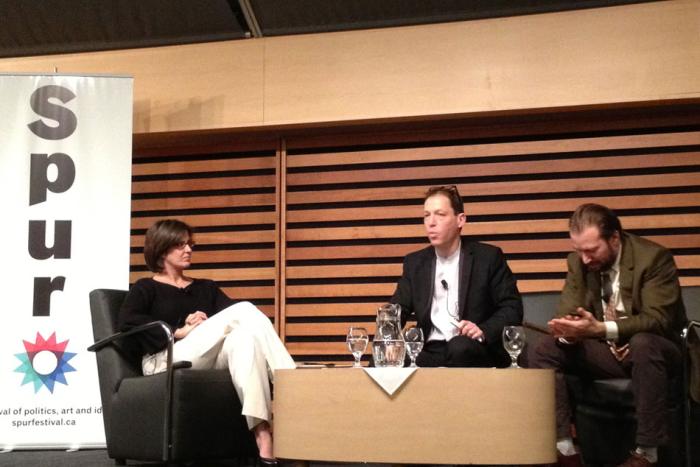David Mamet is not one to do anything by half-measures. After defecting from the “liberal congregation,” as he describes in his Village Voice article “Why I Am No Longer a Brain-Dead Liberal” (2008), he ran to the church of the free market. In his book The Secret Knowledge (2011), the playwright who had taken on issues of business and greed in American Buffalo (1975) and the Pulitzer-winning Glengarry Glen Ross (1983) dismisses what he calls his “tribal assumption that Capitalism was bad,” and declares himself a disciple of Friedrich Hayek and Milton Friedman.
Mamet’s devotion to the Free Enterprise system (the capital letters are his) is such that he’s happy to profit from his earlier work rather than denounce it. No doubt this helps his bottom line: an Al Pacino-starring Broadway revival of Glengarry Glen Ross that ran from last December into January was enormously successful—as opposed to his newest play, The Anarchist, which garnered such negative reviews that its closing was announced the day after its premiere. And despite the fact that in his 2010 book Theatre, he decries state-subsidized companies, which are “subject … to the good wishes of the granting authority,” Mamet has licensed his play Race (2009) to Toronto’s not-for-profit, partially government-funded Canadian Stage. The company’s artistic director, Matthew Jocelyn notes with a laugh, “He probably gets the same percentage of royalties that he gets from everybody else!”
It seems a win-win situation: ticket sales for Race, which premiered April 11, are apparently “very good,” and Jocelyn praises the appeal of “a solid play by a great contemporary author that would be part of a debate.” Indeed, Race doesn’t so much court controversy as proclaim its contentiousness all the way back to the cheap seats: its four characters (a white lawyer played by 90210 star Jason Priestley; his black partner; their young, black, female associate; and a middle-aged rich white man they’re asked to defend against a charge of raping a black woman) spend the better part of 90 minutes shouting at one another in bountifully expletive-strewn Mamet-speak on the subject of race in America. And while it’s possible to take the play entirely on its own terms, Mamet’s increasingly divisive image in the contemporary culture that preoccupies him as a playwright makes it enticing to consider where it fits into his own oeuvre, and how it reflects his status as a public figure.
Mamet retains the ability to create exciting dramatic conflict by opposing points of view that seem evenly matched: each character is flawed and looks to exploit weaknesses in others.
Mamet wrote Race after his 2007 play November, a funny, resolutely non-politically correct farce about a president who seems doomed to lose an election and his lesbian speechwriter. In The Secret Knowledge, he describes the play as a turning-point deriving from a newfound interest in politics. And rather than the conflicted figures that grace his best-known earlier plays (with the exception of Oleanna, whose female character is a zombie stereotype of radical feminism), November’s characters are caricatures; the president, for instance, represents the Right, and his speechwriter the Left. Race, despite its more serious tone, continues this trend: its characters are essentially hooks on which to hang provocative ideas. In Canadian Stage’s Daniel Brooks-directed production, the set design (by Debra Hanson) amplifies the play’s artificial nature: its office-space setting is arid and open-plan, with a featureless grey wall flanked by two 28-foot-tall towers of filing cabinets. These towers allude to the weight of history with which the characters have to contend, and the furniture and the characters’ wardrobes—all black, white, and various shades of grey—ensure that the atmosphere is suffused by the issue of race.
It could be argued that Mamet’s newfound love of right-wing politics makes its way into the play: he has, after all, called it a “tragedy,” and in The Secret Knowledge, he describes right-wing philosophy, following Hayek, as a “Tragic View” that “asserts the imperfectability of Man.” The only character with a shred of idealism is the accused, Charles (played by Matthew Edison at CanStage), whose declaration that “we are all brothers beneath the skin” is met with a laugh from Nigel Shawn Williams’s Henry—and from the audience too. (Charles’s counterpart in Mamet’s recent HBO movie Phil Spector is more convincing when, faced with the charge of murdering a younger woman, the famous producer sets himself aside: “Extraordinary accomplishments transforms [sic] the grateful into an audience, and the envious into a mob.”) In Race, the philosophy behind Affirmative Action (which Mamet claims in The Secret Knowledge “is destroying the Black Youth”) is also undermined by a series of revelations that suggest it leads to cynical decisions on the part of both hirers and potential workers.
But the play is hardly a screed, and Mamet is sensitive to context—for instance, Race views interactions between white men and black women through the lens of a very fraught history, remembering how white men’s dominance in America was enshrined by assumptions about black women’s promiscuity. Mamet retains the ability to create exciting dramatic conflict by opposing points of view that seem evenly matched: each character is flawed and looks to exploit weaknesses in others. This kind of balance is missing from The Secret Knowledge, where Mamet sets himself up as a justified right-wing crusader opposing a straw-man, monolithic Left, which he claims suspends “reason and accountability” in much the same way as the Nazis did. In The New York Times, Christopher Hitchens, himself something of a reformed leftie, called The Secret Knowledge “a straw book.”
In refusing to offer clear-cut answers, Race remains engaging, although its determined focus on debate itself paradoxically limits its impact. The actors in Canadian Stage’s production make their characters likeable—especially Priestley as Jack, who balances the lawyer’s position of self-satisfied privilege with a boyish charisma. But despite the flying f-words and racial epithets, the stakes never seem particularly high—we never get the sense that the case will have any lasting cultural impact, no matter what the outcome, and we learn so little about the characters that we remain dispassionately curious about their possible fates.
Mamet would likely reply that, as he writes in Theatre, “there is no inner life of the character … The character is only a few words of speech delineated on the page”—but those few words can be used to allude to an existence outside the play’s here and now. Even the Beckettian losers marooned in American Buffalo’s junk shop have hopes and dreams that shed light on their petty schemes; in Race, every action, every declaration is subservient to the “alley fight” of the case, which is played out for financial gain or, in the case of the rich Charles, maintenance of the status quo. The associate, Susan (played by Cara Ricketts), does have some semblance of morality, but it seems derived from her status as a type, a black female resisting oppression.
At Toronto’s Bluma Appel Theatre, the (predominantly white) premiere audience laughed and gasped in what seemed appropriate places, and around half of them stood up to clap at the end. It would have been intriguing to gauge their reaction in more depth through one of Canadian Stage’s usual post-show discussions, but Mamet’s agent demanded that no such event be held until two hours after the performance—effectively making it impossible. For Jocelyn, this is “a form of censorship,” but Mamet himself might see his demand as an anti-authoritarian gesture: “theatre can be used to grasp power,” he has written, “but only if it is allowed to function independent of the text.” His demands may exert his control, but the idea that theatre-goers should be allowed to make up their own minds about a text is consistent with his democratic viewpoint. And if you attend the production on Pay-What-You-Can Tuesdays, you can experience the theatre, which Mamet calls “a magnificent example of the workings of that particular bulwark of democracy, the free-market economy,” with your access subsidized by the federal, provincial, and municipal governments—like Mamet, you can have your cake and eat it too.





